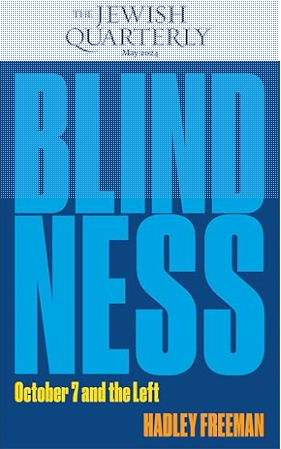Blindness is an anguished attempt by an accomplished writer to explain the imperviousness of the progressive left to the Hamas pogrom on 7 October. Hadley Freeman, like many Jews, was aware of the left’s failings before then but its lack of empathy really hit home after that day’s atrocities. Those who defined their politics in terms of siding with the oppressed seemed blind to the mass slaughter of Jews.
In many ways Blindness runs parallel to the last book reviewed on this site, Camila Bassi’s Outcast. Both authors define themselves as leftists, both are highly critical of Israeli policy and both are horrified by the woke left’s denial of anti-Semitism.
The differences between them are less significant but worth noting. For a start Bassi is from a British Indian background while Freeman is an Anglo-American Jew. Indeed it is to Bassi’s immense credit that she takes anti-Semitism seriously despite having no Jewish background. In contrast, Freeman can talk about anti-Semitism from the perspective of what it has meant for herself and her children.
For example, Freeman describes an incident last November when she picked up her children from their London school. There was a bus with Palestinian flags draped in the window and the driver honking his horn. A man on the bus shouted “fuck Jewish genocide” at her and her children as they crossed the road to get away.
Bassi’s approach is academic, as would be expected of a university lecturer, while Freeman’s is journalistic. For anyone familiar with the academic literature on the subject it is probably easy to grasp the key points in Bassi’s work. However, that constitutes a relatively small number of potential readers. Blindness is likely to prove more accessible to the general public.
Freeman does not pitch herself as an expert on the subject but instead relies heavily on quotes from Anglo-Jewish writers. These include David Baddiel, Jonathan Freedland, Tanya Gold, Howard Jacobson, Anthony Julius, Simon Sebag Montefiore and Dave Rich. In several cases she seems to know them personally. She also sometimes refers to anti-Zionist writers such as Owen Jones and Rashid Khalidi.
Freeman’s account of identity politics – at the core of progressive left ideology – is a model of clarity. She explains how identitarian leftists divide the world into identity groups, in particular in relation to racial and sexual identities. In its most basic form it separates people into two categories: “white” (defined as colonial oppressors) and “people of colour” (defined as the oppressed). From this crude premise it is easy to draw the erroneous conclusion that Jews, defined as white, are the consummate beneficiaries of oppression. This vulgar model is also often applied to the Israel-Palestinian conflict. Israelis are cast as arch colonial oppressors and Palestinians as the epitome of the oppressed.
A weakness of Blindness is its failure to recognise how Muslim anti-Semitism help legitimise leftist hostility to Jews. That is not to say that most let alone all Muslims are anti-Semitic. But the presence of even a small number of anti-Semitic Muslim activists can make Jew hatred seem acceptable to leftists. There is certainly a significant number of such activists among those participating in anti-Israel protests.
The flawed conclusions about Jews follow from the crass premises of identity politics. If Jews are viewed, by definition, as white oppressors and Muslims are, by definition, oppressed then high profile anti-Semitic Muslims help make Jew hatred acceptable. Although the fundamental problem lies with identity politics the existence of anti-Semitism among some Muslims provides a catalyst for its spread.
Overall Blindness is a lucid introduction to a central enigma regarding the progressive left. That is how it can define itself in opposition to oppression while being oblivious to the butchery of Jews.
The aftermath of the 7 October Hamas pogrom in Israel has made the rethinking of anti-Semitism a more urgent task than ever. Both the extent and character of anti-Semitism is changing. Tragically the open expression of anti-Semitic views is once again becoming respectable. It has also become clearer than ever that anti-Semitism is no longer largely confined to the far right. Woke anti-Semitism and Islamism have also become significant forces.
Under these circumstances I am keen not only to maintain this site but to extend its impact. That means raising funds.
The Radicalism of fools has three subscription levels: Free, Premium and Patron.
Free subscribers will receive all the articles on the site and links to pieces I have written for other publications. Anyone can sign up for free.
Premium subscribers will receive all the benefits available to free subscribers plus my Quarterly Report on Anti-Semitism (from April 2024). They will also receive a signed copy of my Letter on Liberty on Rethinking Anti-Semitism and access to an invitee-only Radicalism
of fools Facebook group. These are available for a 17% discounted annual subscription of £100 or a monthly fee of £10 (or the equivalents in other currencies).
Patron subscribers will receive the benefits of Premium subscribers plus a one-to-one meeting with Daniel. This can either be face-to-face if in London or online. This is available for a 17% discounted annual subscription of £250 or a monthly fee of £25 (or the equivalents in other currencies).
You can sign up to either of the paid levels with any credit or debit card. Just click on the “subscribe now” button below to see the available options for subscribing.
You can of course unsubscribe at any time from any of these subscriptions by clicking “unsubscribe” at the foot of each email.
If you have any comments or questions please contact me at daniel@radicalismoffools.com.

